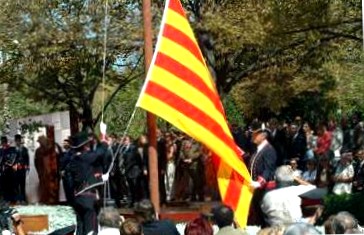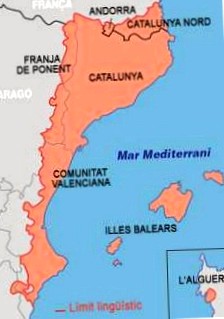“Som una tld”
Catalans achieve virtual independence
Thousands of people demonstrated in barcelona for the recognition of catalonia as a nation. In the virtual space, the catalans are already a decisive step further with their new stld…
Countless flags with the symbols of catalonia flooded the streets of barcelona on 18. February the center of barcelona. Under the slogan "som una nacio" (we are one nation) marched, according to the catalan interior ministry, around 125.000 demonstrators – the organizers spoke of a million – through the city. They criticized the draft of the new autonomy statute and demanded the recognition of catalonia as a "nation". At the head of the procession: josep lluis carod, head of the esquerra republicana (ERC), the only party that supported this manifestation. The weekend before, about 3.000 people at a demonstration organized by the "campana unitaria por la autodeterminacion", even called for independence from spain.

Raising of the flag on 11. September 2005. The 11.9. Is the catalan national holiday
For some time now, the catalan regional government has been negotiating a new autonomy statute with the socialists (PSOE) under jose luis rodriguez zapatero, who have been in power in madrid since 2004. The spanish constitution does not definitively regulate the division of responsibilities between the central government and the autonomous communities, which is why there have been repeated debates about shifting competencies to the regions since it was passed in 1978.
Now the catalan socialists (PSC) under pasqual maragall, who have been in power in barcelona since 2003, had submitted a text to prime minister zapatero after numerous negotiations with their coalition partners. The experts in the central government modified the text and sent it back for a vote, but the left-wing republican ERC once again objected. Main reason: it wants the recognition of the catalans as a "nation" in the 1. Article of the statute and not only in the preamble see fixed. This, however, was against the spanish interception, which in its 2. Article only spain as "nation" defined the catalans as a nationality, a. The president of the constitutional tribunal, maria emilia casas, has already announced that she does not want to endanger the unity of spain through other formulations.
The situation is complicated by the constellation of the governing parties in madrid and barcelona: zapatero does not have an absolute majority and is dependent on the votes of nationalist deputies from the basque country and catalonia for votes in the spanish parliament. His most important procurer of a majority at the moment is the ERC, which would like to secede catalonia from spain. However, as she also knew that there was no majority for this in catalonia at the moment, she took part in the statute negotiations. The PSC, which governs barcelona, also relies on the votes of its coalition partner, the ERC, as well as those of the "green initiative for catalonia/ united left" (ICV) instructed. In the catalan parliament, the votes of the largest opposition party, the conservative-nationalist ciu, are also needed, which is why it sits at the negotiating table.
It’s about money
The main point of contention – and probably more important than the recognition of the catalans as a nation – was the transfer payments for poorer regions and the distribution of tax money. Jose maria aznar of the conservative partido popular (PP) had, during his time in government (1996-2004), when he himself was dependent on the support of catalan and basque nationalists, increased the regions’ share of the revenue from value-added tax and income tax from 15 to 30 percent. Zapatero now wants to increase the share to 50 percent and has also promised that the state investment in catalonia will be measured according to its share in the spanish domestic product.
The ERC in particular is not yet satisfied. It wants absolute fiscal sovereignty as well as authority over the port, airport and paradores (national luxury hotels) for the region as well as its own catalan sports teams. For the problem in catalonia goes far beyond the internationally known language dispute: behind it lie tangible economic interests: catalonia is one of the richest regions in spain. To put it bluntly: the language border is more or less also a welfare border!
"The greatest danger threatens the nation-state from the nation", wrote ralf dahrendorf in 1994, "because the homogenization behind this concept can only be achieved through division in a multi-ethnic state." this is also feared by the PP, which is in opposition in both governments, and sees it coming to an end with spain. It pushes against the statute from all guns, threatens referendum and has at least managed to make catalans more unpopular than ever in spain. However the PP in catalonia also. Thereby the nationalism on the part of the central government resp. Spain’s often much stronger than that of the regions, but then hides behind "normal" government action (for example, when infrastructure projects are brought forward in regions where they obviously make less sense, etc.).).

The spread of the catalan language
.Catz and mouse: the strategy for obtaining the TLD
Viewed from the virtual space, the dispute about the term "nation" yesterday’s news: here the catalans are already a step further, because since the 13. February is the TLD .Cat, initially in three phases for institutions, and from the 23rd of february onwards. April for everyone at the fundacio puntcat resp. Eight registrars available. Over 7.000 applications have already been made.
The launch of the first TLD representing a regional language and culture in september 2005 by ICANN was based on an ingenious strategy, thanks to one man: amadeu abril i abril (see peter gerrand: history of the campaign for approval of ‘.Cat’) he felt inspired in 1996 by a proposal of jon postel, which foresaw the extension of the domain name system. The catalans decided to use the country code .Ct and submitted the proposal to the "international organization for standardization" a. It was rejected because catalonia is not a separate state entity. The spanish central government, for its part, had never supported this proposal, since it would have meant the de facto recognition of catalonia as a nation, something that is still being argued about today.
In 1999 abril i abril becomes a member of the board of directors of ICANN and gets to know the way of working and thinking of the institution and its members. He uses his knowledge and makes two important strategic decisions:
- The new application of the catalans will be submitted only in 2003, to continue the process of the first round of approval for tlds in 2000 (.Info etc.) to be able to analyze better and to be no longer a member of the board of directors.
- It will no longer be the domain .Ct, but .Cat. This step was particularly ingenious, since it was no longer a country code, but the international ISO standard abbreviation for the catalan language.
Abril i abril called this strategy "the change from passport to lexicon". Thus, the political background was defused and the request was related to cultural and linguistic aspects. This was underpinned by the creation of the fundacio puntcat, to which more than 90 institutions around the world belong, calling for catalan culture in various ways.
Moreover, it was now possible to include not only the spanish region of catalonia under sc name="domain", but – following the catalan concept of linguistic community – the so-called catalan countries, i.E. Andorra, roussillon in france, catalonia, the region of valencia, the balearic islands and the sardinian city of alghero. Having your own TLD increases the prestige of the catalan language and culture to the outside world, as well as the catalans’ sense of self-worth. It is the logical continuation of the conquest of the media space for catalan, since its prohibition by the francoist regime in 1939: first some literary works appeared in catalan, then song lyrics, eventually magazines, newspapers, radio and television, and now the internet. "It puts you in the top league", describes abril i abril the importance of the TLD .Cat, "and all this without forcibly moving a border."
After all, catalan – one of the four official languages of spain and national language in andorra – has more speakers than danish, swedish or norwegian. Only, for historical reasons, the state is lacking to obtain the same international recognition. For this reason, one sometimes resorts to measures that appear narrow-minded. Often, however, a smaller language community has no other choice. At least in the virtual space, the language is now on an equal footing.
In march 2004 the fundacio applied for a sponsored TLD (stld) at ICANN. The application met the broad criteria for stlds and was also supported by the new socialist government in madrid. After abril i abril had dispelled even the last concerns of the ICANN board of directors – (question: what happens if all about 6.500 small languages apply for a TLD? – answer: set reasonable limits for minority languages, then there will be only a few candidates left, maybe 15!) -, it approved in september 2005 the new TLD. Head of the government maragall has already set a good example and has published his URL "nationalized".
Literature tip: rafael sevilla et al. (ed.). Catalonia. Tradition and modernity horlemann verlag, bad honnef 2004, 312 pp., 14.90